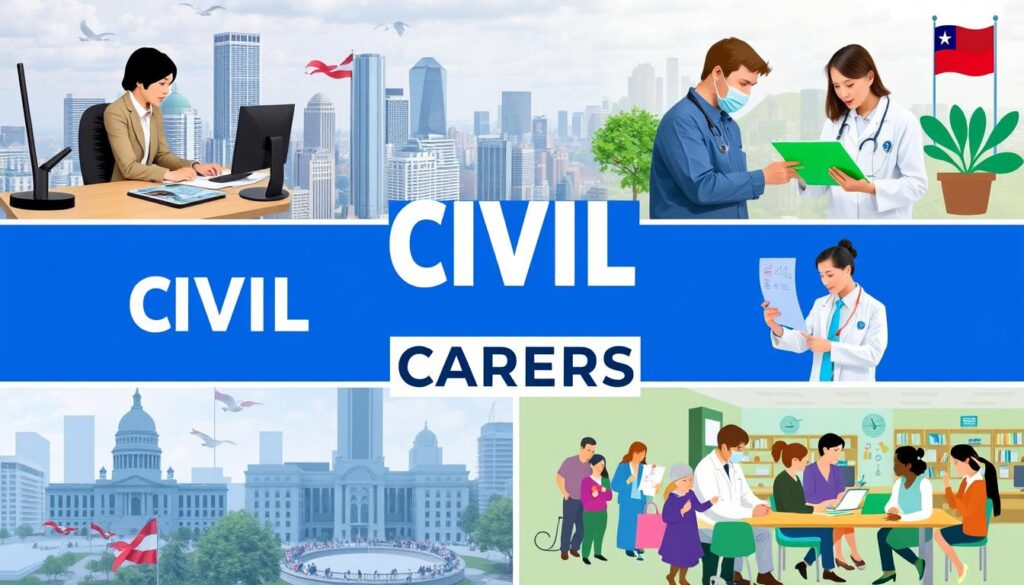Civil service means working for the government at the federal, state, or local level. These jobs are filled through a fair hiring process, not by politics. Working in civil service means you get a steady job, good pay, and benefits. Plus, you help your community.
If you’re into public administration, government, or shaping public policy, civil service could be for you. It’s a fulfilling career path.
Key Takeaways
- Civil service refers to public sector employment at the federal, state, and local levels.
- Civil service positions are obtained through a merit-based hiring process, not political appointments.
- Civil service careers offer job stability, competitive pay and benefits, and the chance to serve the community.
- Individuals interested in public administration, government, or public policy may find rewarding opportunities in civil service.
- The civil service system provides a pathway for individuals to contribute to the public good and make a difference in their communities.
What is Civil Service?
The civil service system is how governments hire and manage their workers. Civil service commissions lead this process, making rules, giving exams, and handling personnel. Jobs range from basic office work to complex roles in fields like engineering and law.
Also Read : Government Jobs: Required Qualifications And Skills
Understanding the Civil Service System
This system aims to hire government workers based on their skills and merits, not their politics or who they know. Candidates go through a tough examination to show they’re right for the job. Once in, civil servants get job security, stability, good pay, and benefits.
Also Read : Crypto Currency: A Beginner’s Guide To Digital Money
Types of Civil Service Positions
- Administrative and Clerical Roles: These positions include secretaries, receptionists, and office managers.
- Professional and Technical Roles: Examples include engineers, lawyers, healthcare professionals, and policy analysts.
- Public Safety Roles: Civil service positions in this category include police officers, firefighters, and emergency responders.
- Managerial and Supervisory Roles: These positions involve overseeing and managing other civil service employees.
| Civil Service Position | Typical Responsibilities | Required Qualifications |
|---|---|---|
| Administrative Assistant | Providing clerical support, managing schedules, and handling correspondence | High school diploma or equivalent, strong computer and organizational skills |
| Environmental Scientist | Conducting research, analyzing data, and developing policies to protect the environment | Bachelor’s or master’s degree in environmental science or a related field |
| Police Officer | Maintaining public safety, responding to emergencies, and enforcing laws | High school diploma or equivalent, completion of police academy training |
Benefits of a Civil Service Career

Working in the civil service has many perks. One big advantage is the job security it brings. Jobs in this field are often safe from layoffs, giving workers peace of mind.
Also Read : Exploring Technology: Innovations For The Future
Job Security and Stability
Civil servants usually have long careers with chances for growth. They can plan for the future and develop personally and professionally. This stability lets them serve their communities without worrying about losing their jobs.
Also Read : Exploring Artificial Intelligences Trends & Insights
Competitive Salaries and Benefits
Civil service jobs also come with great pay and benefits. Government workers get good pay, health insurance, retirement plans, and vacation time. These benefits draw in skilled people who want to help others.
Also Read : What Is Workforce Diversity In US Government Agencies?
For those looking for a rewarding career with stability and great benefits, civil service is a great option. Civil servants use their skills to help others and shape the future. They play a key role in making communities and the country better.
“A career in the civil service provides a unique opportunity to make a meaningful impact on the lives of citizens while enjoying the stability and security that comes with public service.”
How to Apply for Civil Service Jobs

Starting a career in civil service often starts with a competitive exam. These exams check if you know what you need for certain jobs. Passing the exam puts you on a list for civil service jobs.
Taking Civil Service Exams
Civil service exams test your skills and knowledge. It’s important to know what the exam will cover. You might see multiple-choice questions, essays, or tests that show how you work.
Passing the exam can get you on a list for jobs. Agencies use this list to fill their positions.
The NY HELPS Program
In New York State, the NY HELPS program makes getting a civil service job easier. It lets qualified people get hired without an exam. This program makes joining the civil service simpler for those interested.
For anyone looking at civil service jobs, it’s key to know what’s needed. Understanding the steps can help you succeed in getting your dream job.
| Key Steps in the Civil Service Application Process |
|---|
|
“The civil service exam is a crucial step in the appointment process, as it helps government agencies identify the most qualified candidates for their open positions.”
Civil Service Opportunities
Civil service jobs are available at all government levels, like the federal government, state government, and local government. You can work at the municipal, county, city, special district, or school district level. The civil service system has many public agency roles for skilled people.
The federal civil service is run by the Office of Personnel Management. State and local governments have their own civil service boards and hiring ways. You can find jobs in many areas, like law enforcement, transportation, social services, and education. These jobs focus on merit-based hiring, which means the best candidates get the job, not just who you know.
Navigating the Civil Service Landscape
Looking into civil service jobs at the federal, state, and local levels can lead to a stable, rewarding career in public service. If you’re interested in policy, administration, or specialized fields, the civil service is a great choice. It offers a clear, fair way to help your community and country.
“The civil service is not just a job; it’s a calling to make a difference in the lives of others and to serve the greater good.”
When exploring civil service, remember the variety of elected officials and political parties that influence the civil service of the state. Aim to build skills and experience that show you’re a strong, merit-based candidate. Your political views don’t matter in this process.
Unique Civil Service Careers

The civil service is not just about traditional government jobs. It also has special career paths that need unique skills and knowledge. These areas include intelligence and national security, and infrastructure and engineering.
Intelligence and National Security
Careers in intelligence and national security are with agencies like the CIA, FBI, or Department of Homeland Security. They focus on protecting the country from threats and using new technology. You need to know a lot about politics, analyzing data, and the newest in surveillance and cybersecurity.
Civil servants in these jobs are key to keeping the nation safe. They work hard to protect the country’s interests and keep people safe.
Infrastructure and Engineering
The Bipartisan Infrastructure Law has opened up many jobs in infrastructure and engineering in the civil service. These jobs are about building and keeping up the country’s systems, like roads and utilities. Civil servants use their technical skills to make the country’s infrastructure better.
This leads to more innovation and makes life better for everyone in the U.S.
Jobs in intelligence and national security, or infrastructure and engineering, give people a chance to use their skills for the public good.
“Civil servants in these fields play a crucial part in safeguarding the nation’s interests and ensuring public safety.”
Civil Service: A Pathway to Public Service
For those who love public service, a career in civil service is rewarding. Civil servants help shape and carry out government policies and programs. They tackle social, economic, and environmental challenges in their communities.
This career path lets people make a real difference in their community. Civil service jobs cover many areas, like public administration and social impact initiatives. It’s a way to serve the public directly.
Civil servants work at different levels, from federal to local. They turn elected officials’ visions into real solutions. This means everything from making laws to managing budgets and helping with public services.
For those into public service, community service, or government careers, civil service is a great choice. It lets you join teams that work on social change and help your nonprofit and volunteering community.
“The true purpose of government is to improve the lives of the governed.” – Abraham Lincoln
Choosing civil service means using your skills and passion for change. Whether it’s public health, education, or the environment, civil servants shape our future. They are key to making society better.
Also Read : What Are The Challenges In Public Policy For Government Workers?
Conclusion
Civil service careers let you serve the public and help society. You can get hired based on your skills at the federal, state, or local level. You’ll enjoy job security, good pay, and great benefits.
There are many career opportunities in the public sector. You can use your skills for public administration and community projects. The civil service is known for its job security and benefits. It’s a great way to have a fulfilling career in government jobs.
Learning about the civil service system helps you find career opportunities. You can make a big difference in your community and the country. The civil service shows the importance of public service and its dedication to doing good.
FAQs
Q: What is the role of the civil service commission?
A: The civil service commission provides oversight and regulation of the employment process for government positions, ensuring that appointments and promotions are based on merit and equal opportunity for all applicants.
Q: How does the appointment process work in civil service?
A: The appointment process in civil service typically involves a competitive examination, where applicants must demonstrate their qualifications for the position. Upon passing, they may be appointed by the appointing authorities based on the available vacancies.
Q: What types of employment opportunities are available in the county civil service?
A: The county civil service offers a variety of employment opportunities across different classifications, including clerical, technical, and administrative roles, each with specific duties and responsibilities.
Q: What is the importance of equal opportunity in civil service employment?
A: Equal opportunity in civil service employment ensures that all applicants have a fair chance to compete for positions, regardless of their background. This principle is crucial for promoting diversity and efficiency within government services.
Q: What can an applicant expect during the civil service examinations?
A: During civil service examinations, applicants can expect to undergo assessments that evaluate their knowledge, skills, and abilities relevant to the position they are applying for. These exams help to classify candidates effectively for various roles.
Q: How are vacancies announced in the civil service?
A: Vacancies within the civil service are typically announced through official channels, such as the civil service department’s website or local government publications. These announcements provide details regarding the position, qualifications needed, and the application process.
Q: What is the classification system in civil service?
A: The classification system in civil service categorizes government positions based on duties, responsibilities, and requirements. This system helps to maintain order in recruitment and ensures that employees are appropriately compensated for their roles.
Q: How does the civil service commission ensure efficiency in government employment?
A: The civil service commission ensures efficiency by implementing standardized procedures for recruitment, appointment, and promotion, thereby streamlining the hiring process and minimizing biases in selection.
Q: What is the jurisdiction of the municipal civil service commission?
A: The jurisdiction of the municipal civil service commission includes overseeing the civil service processes specific to the municipality, managing recruitment and appointments, and ensuring compliance with civil service regulations at the local level.
Q: What are the typical duties of a government employee in civil service?
A: The typical duties of a government employee in civil service vary by position but often include performing administrative tasks, providing public services, managing resources, and upholding the regulations set forth by the civil service commission.


